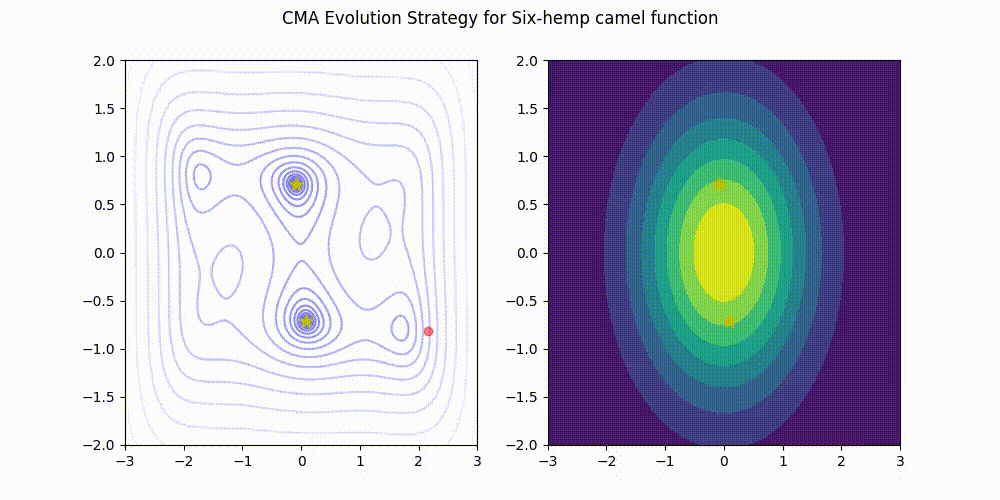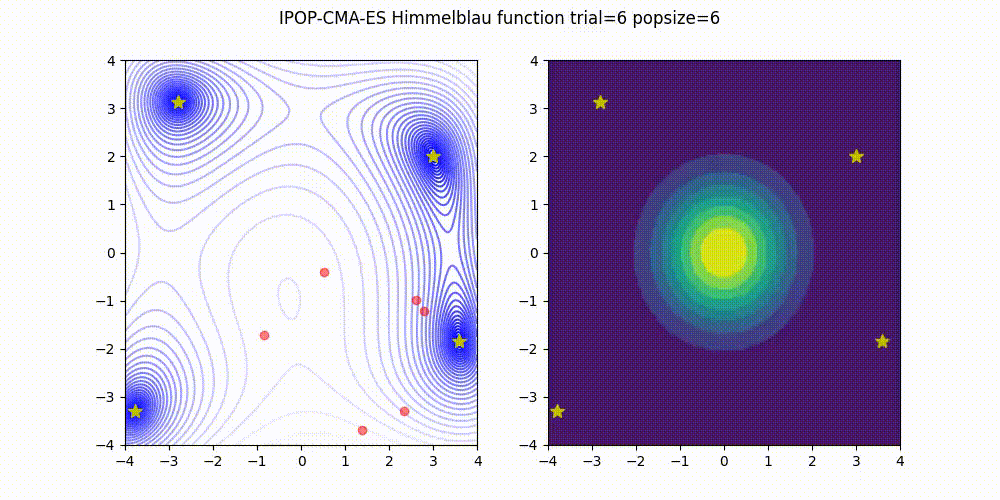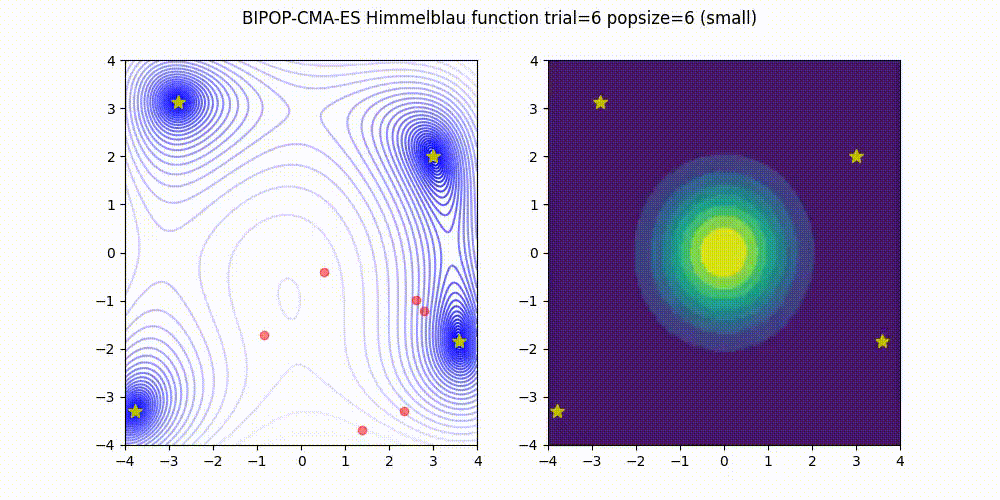Lightweight Covariance Matrix Adaptation Evolution Strategy (CMA-ES) implementation for Python 3.
Project description
CMA-ES
Lightweight Covariance Matrix Adaptation Evolution Strategy (CMA-ES) [1] implementation.
News
- 2021/02/02 The paper "Warm Starting CMA-ES for Hyperparameter Optimization" written by @nmasahiro, the maintainer of this library, is accepted at AAAI 2021 :tada:
- 2020/07/29 Optuna's built-in CMA-ES sampler which uses this library under the hood is stabled at Optuna v2.0. Please check out the v2.0 release blog.
Installation
Supported Python versions are 3.6 or later.
$ pip install cmaes
Or you can install via conda-forge.
$ conda install -c conda-forge cmaes
Usage
This library provides an "ask-and-tell" style interface.
import numpy as np
from cmaes import CMA
def quadratic(x1, x2):
return (x1 - 3) ** 2 + (10 * (x2 + 2)) ** 2
if __name__ == "__main__":
optimizer = CMA(mean=np.zeros(2), sigma=1.3)
for generation in range(50):
solutions = []
for _ in range(optimizer.population_size):
x = optimizer.ask()
value = quadratic(x[0], x[1])
solutions.append((x, value))
print(f"#{generation} {value} (x1={x[0]}, x2 = {x[1]})")
optimizer.tell(solutions)
And you can use this library via Optuna [2], an automatic hyperparameter optimization framework. Optuna's built-in CMA-ES sampler which uses this library under the hood is available from v1.3.0 and stabled at v2.0.0. See the documentation or v2.0 release blog for more details.
import optuna
def objective(trial: optuna.Trial):
x1 = trial.suggest_uniform("x1", -4, 4)
x2 = trial.suggest_uniform("x2", -4, 4)
return (x1 - 3) ** 2 + (10 * (x2 + 2)) ** 2
if __name__ == "__main__":
sampler = optuna.samplers.CmaEsSampler()
study = optuna.create_study(sampler=sampler)
study.optimize(objective, n_trials=250)
CMA-ES variants
Warm Starting CMA-ES [3]
Warm Starting CMA-ES is a method to transfer prior knowledge on similar HPO tasks through the initialization of CMA-ES. It estimates a promising distribution and generates the parameters of the multivariate gaussian distribution like below:
| Rot Ellipsoid function | Ellipsoid function |
|---|---|
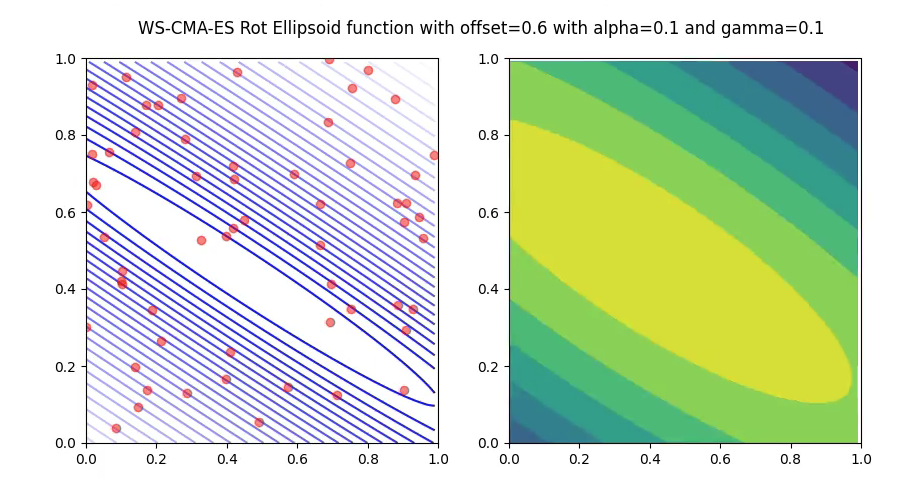 |
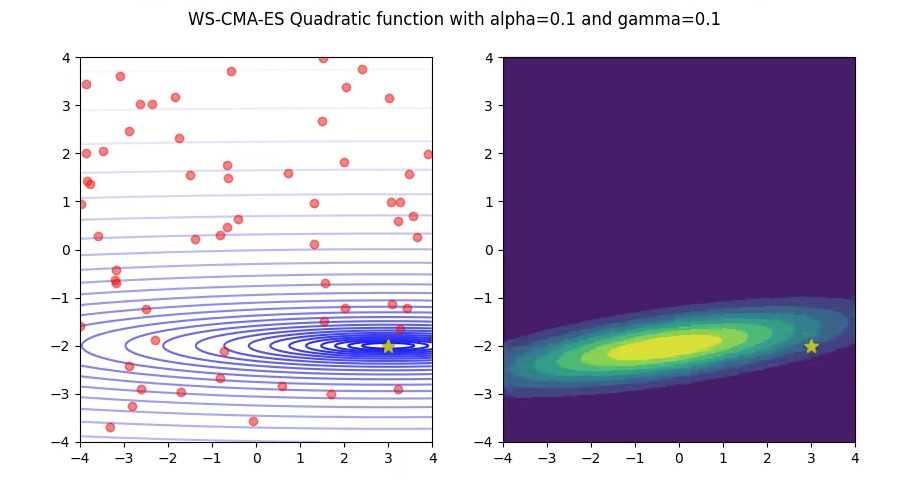 |
Source code
import numpy as np
from cmaes import CMA, get_warm_start_mgd
def source_task(x1: float, x2: float) -> float:
b = 0.4
return (x1 - b) ** 2 + (x2 - b) ** 2
def target_task(x1: float, x2: float) -> float:
b = 0.6
return (x1 - b) ** 2 + (x2 - b) ** 2
if __name__ == "__main__":
# Generate solutions from a source task
source_solutions = []
for _ in range(1000):
x = np.random.random(2)
value = source_task(x[0], x[1])
source_solutions.append((x, value))
# Estimate a promising distribution of the source task
ws_mean, ws_sigma, ws_cov = get_warm_start_mgd(
source_solutions, gamma=0.1, alpha=0.1
)
optimizer = CMA(mean=ws_mean, sigma=ws_sigma, cov=ws_cov)
# Run WS-CMA-ES
print(" g f(x1,x2) x1 x2 ")
print("=== ========== ====== ======")
while True:
solutions = []
for _ in range(optimizer.population_size):
x = optimizer.ask()
value = target_task(x[0], x[1])
solutions.append((x, value))
print(
f"{optimizer.generation:3d} {value:10.5f}"
f" {x[0]:6.2f} {x[1]:6.2f}"
)
optimizer.tell(solutions)
if optimizer.should_stop():
break
The full source code is available here.
Separable CMA-ES [4]
sep-CMA-ES is an algorithm which constrains the covariance matrix to be diagonal. Due to reduce the model complexity, the learning rate for the covariance matrix is reduced. Consequently, this algorithm outperforms CMA-ES on separable functions.
Source code
import numpy as np
from cmaes import SepCMA
def ellipsoid(x):
n = len(x)
if len(x) < 2:
raise ValueError("dimension must be greater one")
return sum([(1000 ** (i / (n - 1)) * x[i]) ** 2 for i in range(n)])
if __name__ == "__main__":
dim = 40
optimizer = SepCMA(mean=3 * np.ones(dim), sigma=2.0)
print(" evals f(x)")
print("====== ==========")
evals = 0
while True:
solutions = []
for _ in range(optimizer.population_size):
x = optimizer.ask()
value = ellipsoid(x)
evals += 1
solutions.append((x, value))
if evals % 3000 == 0:
print(f"{evals:5d} {value:10.5f}")
optimizer.tell(solutions)
if optimizer.should_stop():
break
Full source code is available here.
IPOP-CMA-ES [5]
IPOP-CMA-ES is a method to restart CMA-ES with increasing population size like below.
Source code
import math
import numpy as np
from cmaes import CMA
def ackley(x1, x2):
# https://www.sfu.ca/~ssurjano/ackley.html
return (
-20 * math.exp(-0.2 * math.sqrt(0.5 * (x1 ** 2 + x2 ** 2)))
- math.exp(0.5 * (math.cos(2 * math.pi * x1) + math.cos(2 * math.pi * x2)))
+ math.e + 20
)
if __name__ == "__main__":
bounds = np.array([[-32.768, 32.768], [-32.768, 32.768]])
lower_bounds, upper_bounds = bounds[:, 0], bounds[:, 1]
mean = lower_bounds + (np.random.rand(2) * (upper_bounds - lower_bounds))
sigma = 32.768 * 2 / 5 # 1/5 of the domain width
optimizer = CMA(mean=mean, sigma=sigma, bounds=bounds, seed=0)
for generation in range(200):
solutions = []
for _ in range(optimizer.population_size):
x = optimizer.ask()
value = ackley(x[0], x[1])
solutions.append((x, value))
print(f"#{generation} {value} (x1={x[0]}, x2 = {x[1]})")
optimizer.tell(solutions)
if optimizer.should_stop():
# popsize multiplied by 2 (or 3) before each restart.
popsize = optimizer.population_size * 2
mean = lower_bounds + (np.random.rand(2) * (upper_bounds - lower_bounds))
optimizer = CMA(mean=mean, sigma=sigma, population_size=popsize)
print(f"Restart CMA-ES with popsize={popsize}")
Full source code is available here.
BIPOP-CMA-ES [6]
BIPOP-CMA-ES applies two interlaced restart strategies, one with an increasing population size and one with varying small population sizes.
Source code
import math
import numpy as np
from cmaes import CMA
def ackley(x1, x2):
# https://www.sfu.ca/~ssurjano/ackley.html
return (
-20 * math.exp(-0.2 * math.sqrt(0.5 * (x1 ** 2 + x2 ** 2)))
- math.exp(0.5 * (math.cos(2 * math.pi * x1) + math.cos(2 * math.pi * x2)))
+ math.e + 20
)
if __name__ == "__main__":
bounds = np.array([[-32.768, 32.768], [-32.768, 32.768]])
lower_bounds, upper_bounds = bounds[:, 0], bounds[:, 1]
mean = lower_bounds + (np.random.rand(2) * (upper_bounds - lower_bounds))
sigma = 32.768 * 2 / 5 # 1/5 of the domain width
optimizer = CMA(mean=mean, sigma=sigma, bounds=bounds, seed=0)
n_restarts = 0 # A small restart doesn't count in the n_restarts
small_n_eval, large_n_eval = 0, 0
popsize0 = optimizer.population_size
inc_popsize = 2
# Initial run is with "normal" population size; it is
# the large population before first doubling, but its
# budget accounting is the same as in case of small
# population.
poptype = "small"
for generation in range(200):
solutions = []
for _ in range(optimizer.population_size):
x = optimizer.ask()
value = ackley(x[0], x[1])
solutions.append((x, value))
print(f"#{generation} {value} (x1={x[0]}, x2 = {x[1]})")
optimizer.tell(solutions)
if optimizer.should_stop():
n_eval = optimizer.population_size * optimizer.generation
if poptype == "small":
small_n_eval += n_eval
else: # poptype == "large"
large_n_eval += n_eval
if small_n_eval < large_n_eval:
poptype = "small"
popsize_multiplier = inc_popsize ** n_restarts
popsize = math.floor(
popsize0 * popsize_multiplier ** (np.random.uniform() ** 2)
)
else:
poptype = "large"
n_restarts += 1
popsize = popsize0 * (inc_popsize ** n_restarts)
mean = lower_bounds + (np.random.rand(2) * (upper_bounds - lower_bounds))
optimizer = CMA(
mean=mean,
sigma=sigma,
bounds=bounds,
population_size=popsize,
)
print("Restart CMA-ES with popsize={} ({})".format(popsize, poptype))
Full source code is available here.
Benchmark results
| Rosenbrock function | Six-Hump Camel function |
|---|---|
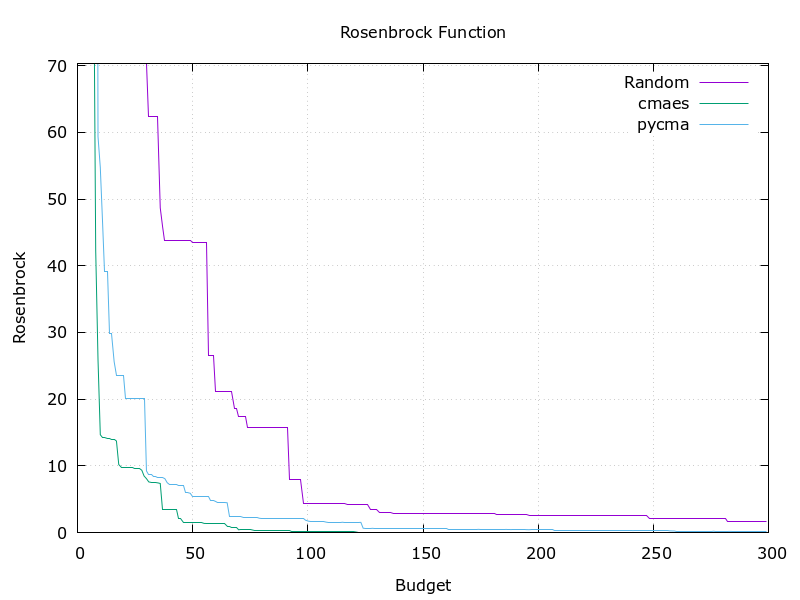 |
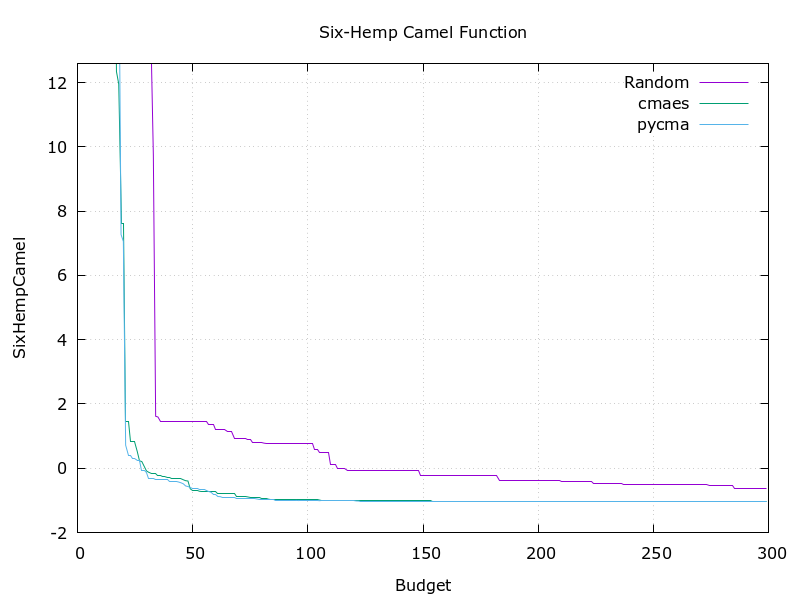 |
This implementation (green) stands comparison with pycma (blue). See benchmark for details.
Links
Other libraries:
I respect all libraries involved in CMA-ES.
- pycma : Most famous CMA-ES implementation by Nikolaus Hansen.
- pymoo : Multi-objective optimization in Python.
References:
- [1] N. Hansen, The CMA Evolution Strategy: A Tutorial. arXiv:1604.00772, 2016.
- [2] Takuya Akiba, Shotaro Sano, Toshihiko Yanase, Takeru Ohta, Masanori Koyama. 2019. Optuna: A Next-generation Hyperparameter Optimization Framework. In The 25th ACM SIGKDD Conference on Knowledge Discovery and Data Mining (KDD ’19), August 4–8, 2019.
- [3] Masahiro Nomura, Shuhei Watanabe, Youhei Akimoto, Yoshihiko Ozaki, Masaki Onishi. “Warm Starting CMA-ES for Hyperparameter Optimization”, AAAI. 2021.
- [4] Raymond Ros, Nikolaus Hansen. A Simple Modification in CMA-ES Achieving Linear Time and Space Complexity. 10th International Conference on Parallel Problem Solving From Nature, Sep 2008, Dortmund, Germany. inria-00287367.
- [5] Auger, A., Hansen, N.: A restart CMA evolution strategy with increasing population size. In: Proceedings of the 2005 IEEE Congress on Evolutionary Computation (CEC’2005), pp. 1769–1776 (2005a)
- [6] Hansen N. Benchmarking a BI-Population CMA-ES on the BBOB-2009 Function Testbed. In the workshop Proceedings of the Genetic and Evolutionary Computation Conference, GECCO, pages 2389–2395. ACM, 2009.
Project details
Release history Release notifications | RSS feed
Download files
Download the file for your platform. If you're not sure which to choose, learn more about installing packages.
Source Distribution
Built Distribution
Filter files by name, interpreter, ABI, and platform.
If you're not sure about the file name format, learn more about wheel file names.
Copy a direct link to the current filters
File details
Details for the file cmaes-0.8.1.tar.gz.
File metadata
- Download URL: cmaes-0.8.1.tar.gz
- Upload date:
- Size: 16.4 kB
- Tags: Source
- Uploaded using Trusted Publishing? No
- Uploaded via: twine/3.3.0 pkginfo/1.7.0 requests/2.25.1 setuptools/53.0.0 requests-toolbelt/0.9.1 tqdm/4.56.1 CPython/3.8.7
File hashes
| Algorithm | Hash digest | |
|---|---|---|
| SHA256 |
94898ff93b1be592bd13f4df4b78d4daab66211387a8e57139497d8041f8d3bd
|
|
| MD5 |
bf26fff75fd85faa2923ededfdc56f67
|
|
| BLAKE2b-256 |
016e02c7042f5f79f99af7b376c8aa6500114ee7e74e5affe4533d74efc75e08
|
File details
Details for the file cmaes-0.8.1-py3-none-any.whl.
File metadata
- Download URL: cmaes-0.8.1-py3-none-any.whl
- Upload date:
- Size: 15.5 kB
- Tags: Python 3
- Uploaded using Trusted Publishing? No
- Uploaded via: twine/3.3.0 pkginfo/1.7.0 requests/2.25.1 setuptools/53.0.0 requests-toolbelt/0.9.1 tqdm/4.56.1 CPython/3.8.7
File hashes
| Algorithm | Hash digest | |
|---|---|---|
| SHA256 |
05d269b288c0d5f023bd9f6a402f406939bc605fa8d9301b0c38dcd18a7828e8
|
|
| MD5 |
461e60a08e914b3947c4f82b4a6de224
|
|
| BLAKE2b-256 |
21a221775c7343e7dd345e5e12cc7b8432e3d3edae2043b01bc2ecf38c432ef7
|





